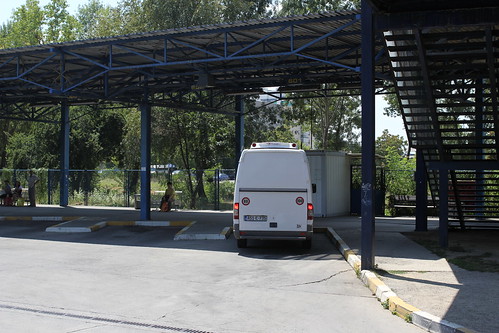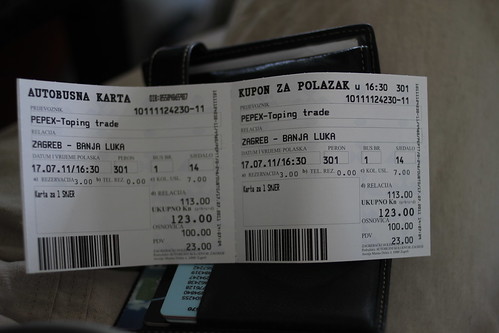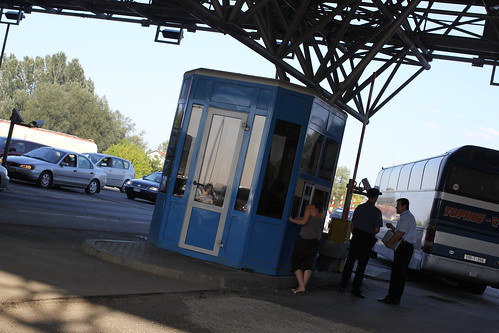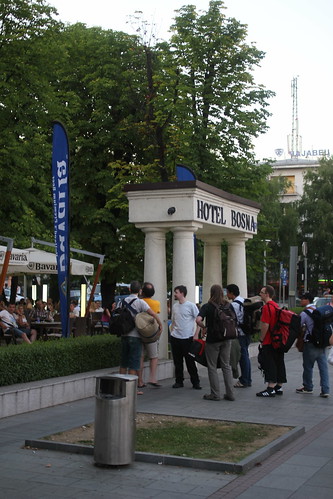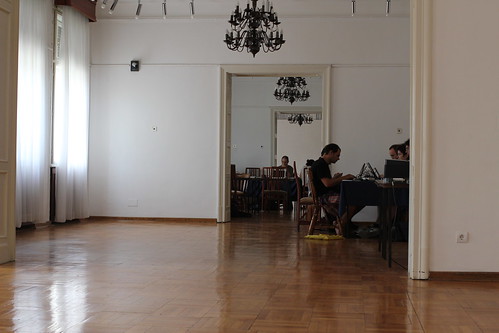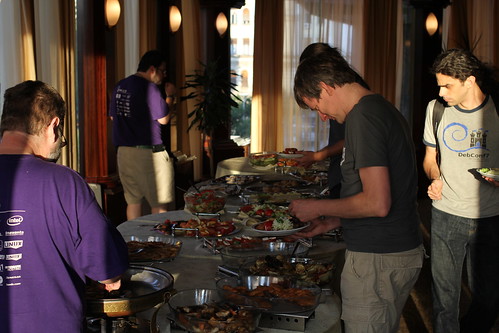
I'm playing with btrfs to get a feel for what's coming up in linux filesystems. To be daring, i've configured a test machine using only btrfs for its on-disk filesystems. I really like some of the ideas put forward in the btrfs design. (i'm aware that btrfs is considered experimental-only at this point). I'm happy to report that despite several weeks of regular upgrade/churn from unstable and experimental, i have yet to see any data loss or other serious forms of failure. Unfortunately, i'm not impressed with the performance. The machine feels sluggish in this configuratiyon, compared to how i remember it running with previous non-btrfs installations. So i ran some benchmarks. The results don't look good for btrfs in its present incarnation. UPDATE: see the comments section for revised statistics from a quieter system, with the filesystems over the same partition (btrfs is still much slower). The simplified test system i'm running has Linux kernel 2.6.39-rc6-686-pae (from experimental), 1GiB of RAM (no swap), and a single 2GHz P4 CPU. It has one parallel ATA hard disk (
WDC WD400EB-00CPF0), with two primary partitions (one btrfs and one ext3). The root filesystem is btrfs. The ext3 filesystem is mounted at
/mnt I used
bonnie++ to benchmark the ext3 filesystem against the btrfs filesystem as a non-privileged user. Here are the results on the test ext3 filesystem:
consoleuser@loki:~$ cat bonnie-stats.ext3
Reading a byte at a time...done
Reading intelligently...done
start 'em...done...done...done...done...done...
Create files in sequential order...done.
Stat files in sequential order...done.
Delete files in sequential order...done.
Create files in random order...done.
Stat files in random order...done.
Delete files in random order...done.
Version 1.96 ------Sequential Output------ --Sequential Input- --Random-
Concurrency 1 -Per Chr- --Block-- -Rewrite- -Per Chr- --Block-- --Seeks--
Machine Size K/sec %CP K/sec %CP K/sec %CP K/sec %CP K/sec %CP /sec %CP
loki 2264M 331 98 23464 11 10988 4 1174 85 39629 6 130.4 5
Latency 92041us 1128ms 1835ms 166ms 308ms 6549ms
Version 1.96 ------Sequential Create------ --------Random Create--------
loki -Create-- --Read--- -Delete-- -Create-- --Read--- -Delete--
files /sec %CP /sec %CP /sec %CP /sec %CP /sec %CP /sec %CP
16 9964 26 +++++ +++ 13035 26 11089 27 +++++ +++ 11888 24
Latency 17882us 1418us 1929us 489us 51us 650us
1.96,1.96,loki,1,1305039600,2264M,,331,98,23464,11,10988,4,1174,85,39629,6,130.4,5,16,,,,,9964,26,+++++,+++,13035,26,11089,27,+++++,+++,11888,24,92041us,1128ms,1835ms,166ms,308ms,6549ms,17882us,1418us,1929us,489us,51us,650us
consoleuser@loki:~$
And here are the results for btrfs (on the main filesystem):
consoleuser@loki:~$ cat bonnie-stats.btrfs
Reading a byte at a time...done
Reading intelligently...done
start 'em...done...done...done...done...done...
Create files in sequential order...done.
Stat files in sequential order...done.
Delete files in sequential order...done.
Create files in random order...done.
Stat files in random order...done.
Delete files in random order...done.
Version 1.96 ------Sequential Output------ --Sequential Input- --Random-
Concurrency 1 -Per Chr- --Block-- -Rewrite- -Per Chr- --Block-- --Seeks--
Machine Size K/sec %CP K/sec %CP K/sec %CP K/sec %CP K/sec %CP /sec %CP
loki 2264M 43 99 22682 17 10356 6 1038 79 28796 6 86.8 99
Latency 293ms 727ms 1222ms 46541us 504ms 13094ms
Version 1.96 ------Sequential Create------ --------Random Create--------
loki -Create-- --Read--- -Delete-- -Create-- --Read--- -Delete--
files /sec %CP /sec %CP /sec %CP /sec %CP /sec %CP /sec %CP
16 1623 33 +++++ +++ 2182 57 1974 27 +++++ +++ 1907 44
Latency 78474us 6839us 8791us 1746us 66us 64034us
1.96,1.96,loki,1,1305040411,2264M,,43,99,22682,17,10356,6,1038,79,28796,6,86.8,99,16,,,,,1623,33,+++++,+++,2182,57,1974,27,+++++,+++,1907,44,293ms,727ms,1222ms,46541us,504ms,13094ms,78474us,6839us,8791us,1746us,66us,64034us
consoleuser@loki:~$
As you can see, btrfs is significantly slower in several categories:
- writing character-at-a-time is *much* slower: 43K/sec vs. 331K/sec
- reading block-at-a-time is slower: 28796K/sec vs. 39629K/sec
- all forms of file creation and deletion are nearly an order of magnitude slower
- Random seeks are almost as fast, but they swamp the CPU
I'm hoping that i just configured the test wrong somehow, or that i've done something grossly unfair in the system setup and configuration. (or maybe i'm mis-reading the
bonnie++ output?) Maybe someone can point out my mistake, or give me pointers for what to do to try to speed up btrfs. I like the sound of the features we will eventually get from btrfs, but these performance figures seem like a pretty rough tradeoff.Tags:
benchmarks,
bonnie,
btrfs,
ext3
 A friend wrote me a simple question today. My response turned out to be longer than i expected, but i hope it's useful (and maybe other people will have better suggestions) so i thought i'd share it here too: Angela Starita wrote:
A friend wrote me a simple question today. My response turned out to be longer than i expected, but i hope it's useful (and maybe other people will have better suggestions) so i thought i'd share it here too: Angela Starita wrote:  I am transitioning my
I am transitioning my 
 Summary: It is important that we (the Debian community that relies on OpenPGP through
GNU Privacy Guard) stop using short key IDs. There is no vulnerability in OpenPGP and GPG.
However, using short key IDs (like 0x70096AD1) is
fundementally insecure; it is easy to generate collisions for short key IDs.
We should always use 64-bit (or longer) key IDs, like: 0x37E1C17570096AD1
or 0xEC4B033C70096AD1.
TL;DR: This now gives two results: gpg --recv-key 70096AD1
Summary: It is important that we (the Debian community that relies on OpenPGP through
GNU Privacy Guard) stop using short key IDs. There is no vulnerability in OpenPGP and GPG.
However, using short key IDs (like 0x70096AD1) is
fundementally insecure; it is easy to generate collisions for short key IDs.
We should always use 64-bit (or longer) key IDs, like: 0x37E1C17570096AD1
or 0xEC4B033C70096AD1.
TL;DR: This now gives two results: gpg --recv-key 70096AD1
 Jean-Yves Lefort s
Jean-Yves Lefort s 
 If you still want to grab documents that used to be on
If you still want to grab documents that used to be on  Short version arrival was quite easy, the
Short version arrival was quite easy, the 

